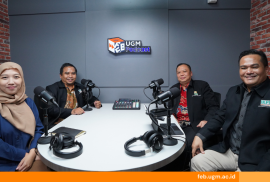The Center of Accounting and Regulation Studies (PAKAR), Laboratorium of Accounting, Department of Accounting, Faculty of Economics and Business UGM held a webinar on the topic “Accountability in Non-Profit Organizations” on Thursday (14/04). The event invited Miranti Kartika Dewi, Ph.D., a lecturer of the Accounting Department of theFaculty of Economics and Business at theUniversity of Indonesia. Miranti brought up the topic of non-profit organizations in her research several years ago and shared some insights related to it in the webinar. The webinar was hosted by Dewi Fatmawati, S.E., M.Ec., as a coordinator of PAKAR FEB UGM.
In her discussion, Miranti explained a lot about tips on research writing, such as topic selection and theoretical framework. Choosing a topic that can be used as research material can be done through future research from empirical papers, commentary papers, review papers, and books. She also revealed that consulting with a mentor can help determine relevant topics.
Then, she also recommended that one attended conferences to meet with authors or editors of well-known journals to present the research being carried out. The next stage is finding the research gap. Researchers are expected to be able to criticize the papers obtained and find existing research gaps. This stage can also be done through the help of software.
Miranti also mentioned that non-profit organizations support the government and the private sector to serve the community in becoming more prosperous. Non-profit organizations have great potential but are limited in their resources. Miranti carried out research related to the beneficial accountability of non-profit organizations because this has not been widely discussed in the literature.
Furthermore, Miranti also explained how to determine the theoretical framework. She gave an example wherein in her research related to non-profit organizations, the theory of social capital was used. Social capital is an asset that comes from a combination of relationships and norms that allow individuals and communities to act collectively in securing benefits through the value creation process.
In her research on non-profit organizations, Miranti also used qualitative and interpretive methodology. The case study approach uses semi-structured interviews, focus groups, observations, and documentary analysis. Then, Miranti also provided several ways to choose the right journal, such as identifying the target journal with a good ranking, paying attention to the authors and submission guidelines in detail, and identifying the editorial team and potential reviewers.
Reportage: Zahra Dian




